【新课标】Unit 3 SectionB(2a-2d) 课件(新目标九年级Unit3 Could you please tell me where the restrooms are)
文档属性
| 名称 | 【新课标】Unit 3 SectionB(2a-2d) 课件(新目标九年级Unit3 Could you please tell me where the restrooms are) | 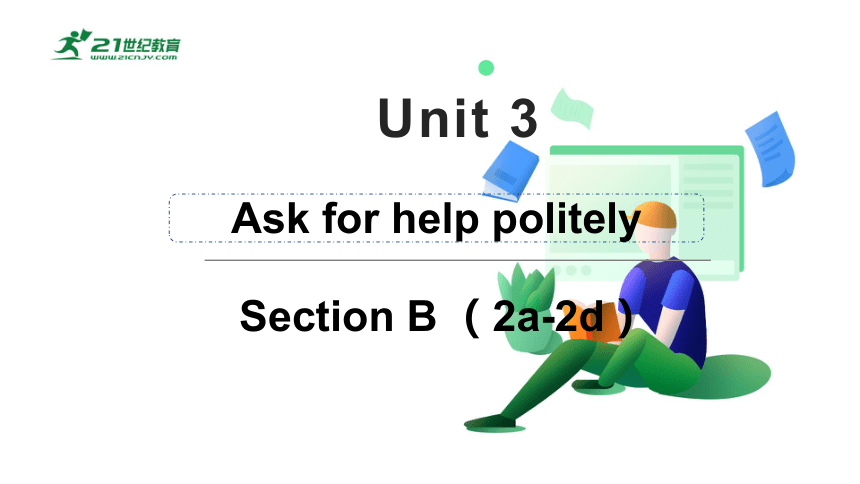 | |
| 格式 | pptx | ||
| 文件大小 | 3.4MB | ||
| 资源类型 | 试卷 | ||
| 版本资源 | 人教新目标(Go for it)版 | ||
| 科目 | 英语 | ||
| 更新时间 | 2023-09-14 21:14:09 | ||
图片预览

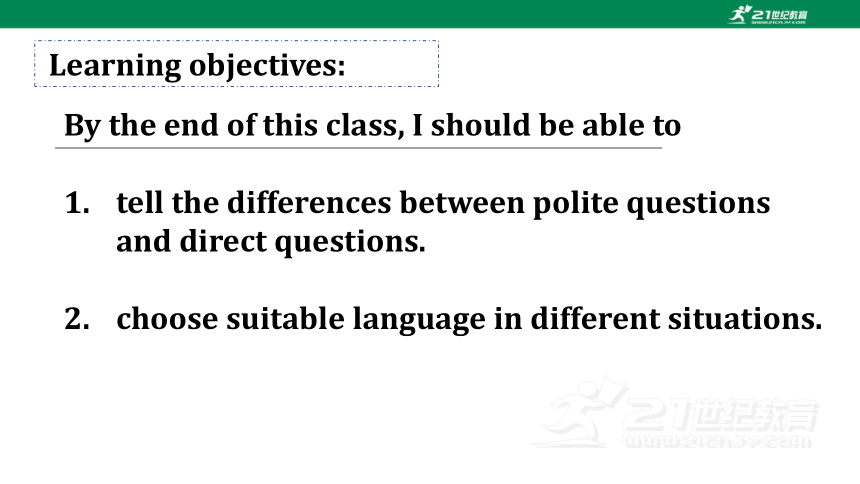

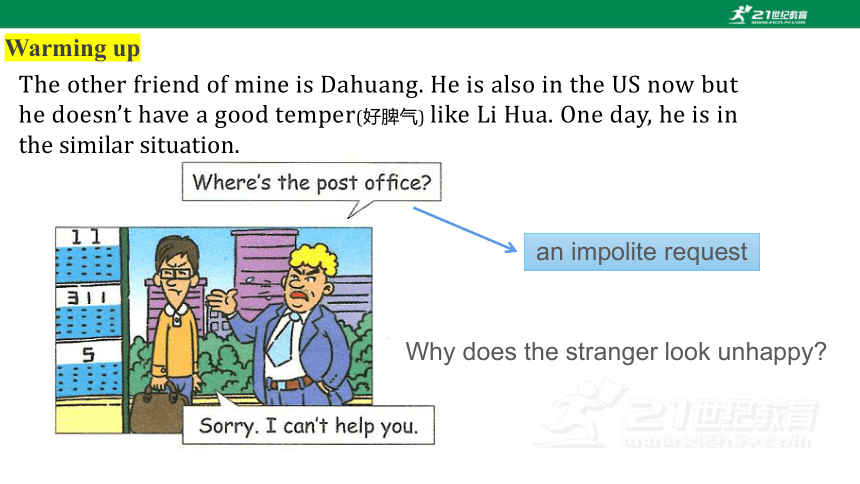
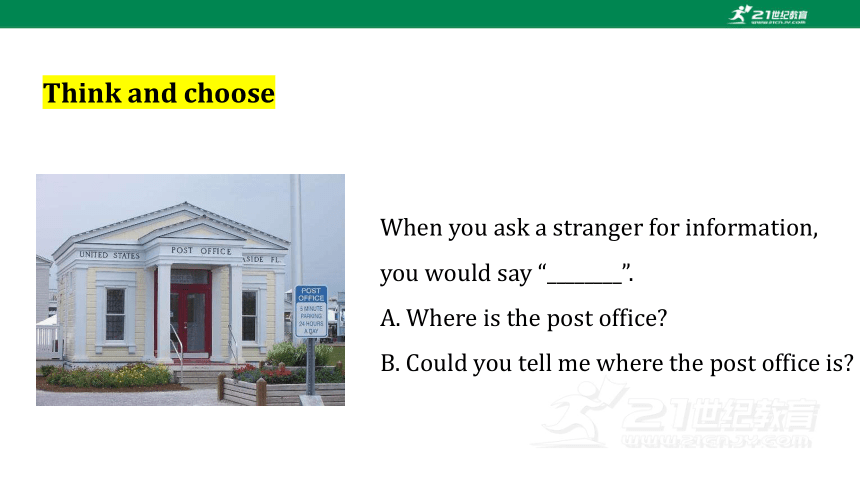
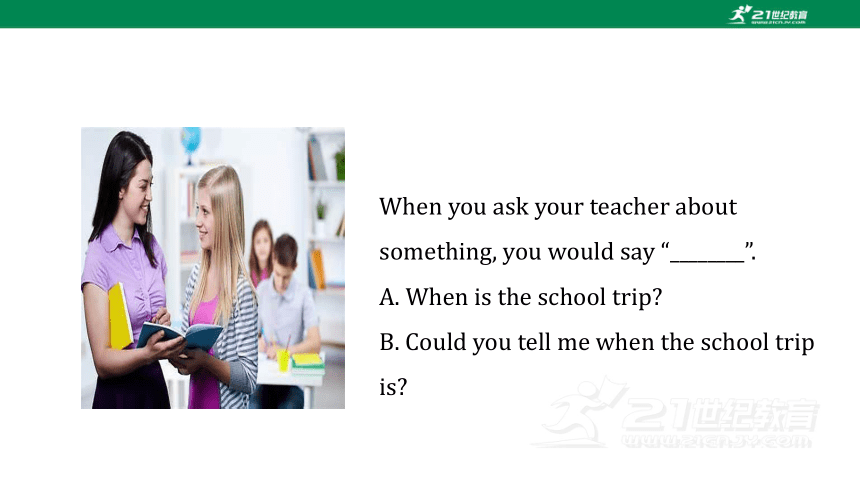
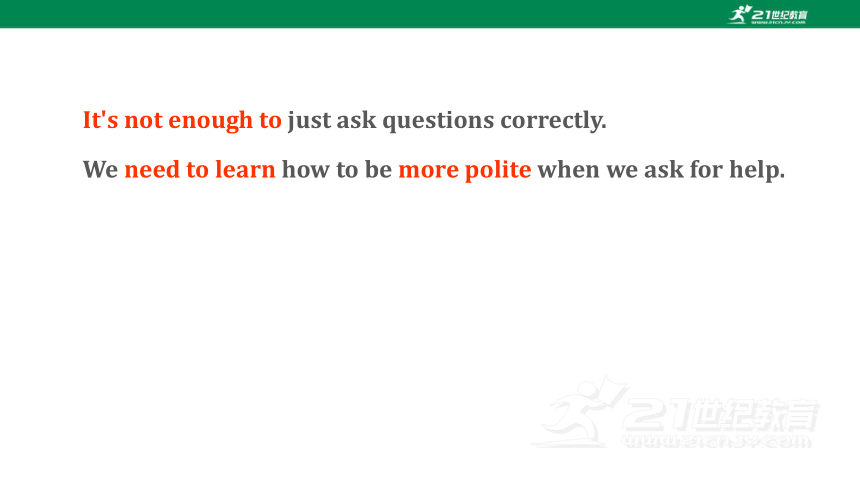
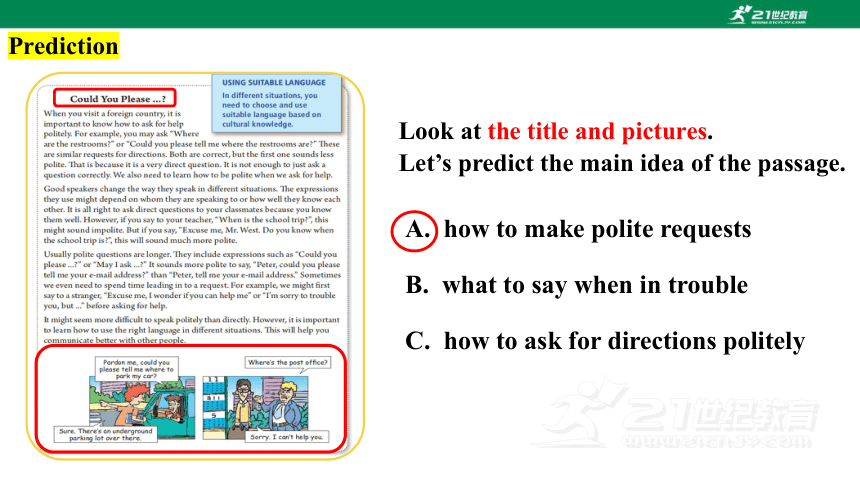

文档简介
(共26张PPT)
Section B (2a-2d)
Unit 3
Ask for help politely
Learning objectives:
By the end of this class, I should be able to
tell the differences between polite questions and direct questions.
choose suitable language in different situations.
a polite request
I have two good friends. One of them is Li Hua. He is always so active and happy that it seems like nothing is impossible for him.
Warming-up
Now he is traveling in America. He wants to find an underground parking lot but he doesn’t know the way now.
Why does the stranger happily offer help
an impolite request
Warming up
The other friend of mine is Dahuang. He is also in the US now but he doesn’t have a good temper(好脾气) like Li Hua. One day, he is in the similar situation.
Why does the stranger look unhappy
When you ask a stranger for information, you would say “________”.
A. Where is the post office
B. Could you tell me where the post office is
Think and choose
When you ask your teacher about something, you would say “________”.
A. When is the school trip
B. Could you tell me when the school trip is
It's not enough to just ask questions correctly.
We need to learn how to be more polite when we ask for help.
Prediction
Look at the title and pictures.
Let’s predict the main idea of the passage.
A. how to make polite requests
B. what to say when in trouble
C. how to ask for directions politely
Fast reading
The topic sentence usually
falls on the first sentence of
each paragraph. Sometimes,
it is after the words like but,
however.
Read and underline the topic sentences in each paragraph.
Careful reading-para.1
Questions
Similarities
Differences
requests for directions
both correct
Where are...
Could you...
less polite, direct
more polite, indirect
Topic
Lead into the topic
Conclusion
When you visit a foreign country,it is important to know how to ask for help .
.
Where are the restrooms
Could you please tell me where the restrooms are?
It is not enough to just ask a question .We also
need to learn when we ask for help.
politely
correctly
how to be polite
Examples
Good speakers
they speak
in different situations.
Careful reading-para.2
they know each other.
they are speaking to.
depend on
the __________
whom
how well
change the way
relationship
Careful reading-para.3
Ways to make polite questions longer
By including
.
By _________
a request
Could you please...
May I ask...
Excuse me ,I wonder if you can help me.
I'm sorry to trouble you, but...
expressions
leading into
Careful reading-para.4
What does “this” refer to
Using the right language in different situations.
Structure
①
②③
④
②③④
①
A B
What is the structure
Topic
(the importance of being polite)
Body-explanation of the topic
(how to be polite)
Conclusion
(emphasize强调 the importance of being polite)
It’s normal for us to ask for help in daily life, _________(especial) when we arrive in a new place. Asking for directions is usually the first thing we do, and ________(know) how to ask politely and properly can make our life much easier.
First, we should change the way we speak _____ the situations change. If we are talking to our classmates, we could simply say “when is the school trip ” However, if we are asking our teachers, we need to ask more_______ (polite). As we all know, the polite questions are longer than the _______(polite) ones. Sometimes we even spend time _______(lead) into a request. For example, we probably say “excuse me” _______we really ask the questions.
In conclusion, it might seem more difficult to speak politely than ______(direct). However, it is important to learn ____ to use the right language _________(different). This will help you have better_____________(communicate) with other people.
especially
knowing
when
politely
impolite
leading
before
directly
how
differently
communication
I’d like sth., please.
Could I have sth., please
Would you mind doing sth., please
I’m wondering if you could do sth.
I don’t suppose you could do sth. for me, could you
Post-reading-more expressions of polite requests
More expressions of polite requests:
USING SUITABLE LANGUAGE
In different situations, you need to choose and use suitable language
based on cultural knowledge.
Politeness does no harm to people.
Post-reading
Good words are warm in winter,
bad words are cold in June.
Direct questions Polite requests
2c Find all the direct questions and polite requests from the passage.
Post-reading
Where are the restrooms
When is the school trip
Where is the post office
Could you please tell me where the restrooms are
Excuse me, do you know when the school trip is
Pardon me, could you please tell me where to park my car
While-reading
Fill in the blanks according to the passage.
less polite
they know each other
more difficult
request
communicate better with
Post-reading
2. These are similar requests for directions.
request v./n. 意为“要求,请求”
常见短语:
(1) request sth. from sb. 意为“(向某人)请求某物/某事”
(2) request sb.to do sth. 意为“请求某人做某事”
(3) request + that 从句(从句用虚拟语气:should + 动词原形,should
可以省略)
e.g. The man requested some hot water from me.
3. Both are correct, but the first one sounds less polite.
(1) less 后面加上多音节形容词是比较级,与more的意思相反。
有时可以和“not as/so+ adj./adv.+ as”进行互换。
less polite 意为“不如……礼貌”。
e.g. That city is less fascinating than ours.
=That city is not as/so fascinating than ours.
(2) sound 是系动词,意为“听起来……”。
e.g. Don’t think that English is less important now.
Post-reading
4. The expressions they use might depend on whom they are speaking
to or how well they know each other.
(1) 此句为复合句,they use 是省略了关系代词that或which的定语从句,
修饰先行词the expressions; whom they speaking to和how well they know
each other是宾语从句,作介词on的宾语。
(2) depend on 意为“取决于;依赖于”,on为介词,可以换成upon,
后接名词、代词、动名词或接宾语从句。
e.g. You can depend on him to make a right choice.
Post-reading
Summary
Key words and phrases:
polite, direction, request, correct, politely, direct, speaker, whom, impolitely, address, underground, depend on, ask for help politely…
Key sentences:
Will you pass the salt
Dou you know where I can change some money, please
Could you tell me what just happened
Can you please tell me where the nearest station is
Excuse me, do you know what time it begins, please
Let me know when you’re ready, OK
Could you possibly tell me the way to the village school
Homework
1. Review the new words and expressions you’ve
learned today.
2. Find more examples of other polite requests.
3. Try to use the language we learned in this class in
your daily life.
Goodbye!
Section B (2a-2d)
Unit 3
Ask for help politely
Learning objectives:
By the end of this class, I should be able to
tell the differences between polite questions and direct questions.
choose suitable language in different situations.
a polite request
I have two good friends. One of them is Li Hua. He is always so active and happy that it seems like nothing is impossible for him.
Warming-up
Now he is traveling in America. He wants to find an underground parking lot but he doesn’t know the way now.
Why does the stranger happily offer help
an impolite request
Warming up
The other friend of mine is Dahuang. He is also in the US now but he doesn’t have a good temper(好脾气) like Li Hua. One day, he is in the similar situation.
Why does the stranger look unhappy
When you ask a stranger for information, you would say “________”.
A. Where is the post office
B. Could you tell me where the post office is
Think and choose
When you ask your teacher about something, you would say “________”.
A. When is the school trip
B. Could you tell me when the school trip is
It's not enough to just ask questions correctly.
We need to learn how to be more polite when we ask for help.
Prediction
Look at the title and pictures.
Let’s predict the main idea of the passage.
A. how to make polite requests
B. what to say when in trouble
C. how to ask for directions politely
Fast reading
The topic sentence usually
falls on the first sentence of
each paragraph. Sometimes,
it is after the words like but,
however.
Read and underline the topic sentences in each paragraph.
Careful reading-para.1
Questions
Similarities
Differences
requests for directions
both correct
Where are...
Could you...
less polite, direct
more polite, indirect
Topic
Lead into the topic
Conclusion
When you visit a foreign country,it is important to know how to ask for help .
.
Where are the restrooms
Could you please tell me where the restrooms are?
It is not enough to just ask a question .We also
need to learn when we ask for help.
politely
correctly
how to be polite
Examples
Good speakers
they speak
in different situations.
Careful reading-para.2
they know each other.
they are speaking to.
depend on
the __________
whom
how well
change the way
relationship
Careful reading-para.3
Ways to make polite questions longer
By including
.
By _________
a request
Could you please...
May I ask...
Excuse me ,I wonder if you can help me.
I'm sorry to trouble you, but...
expressions
leading into
Careful reading-para.4
What does “this” refer to
Using the right language in different situations.
Structure
①
②③
④
②③④
①
A B
What is the structure
Topic
(the importance of being polite)
Body-explanation of the topic
(how to be polite)
Conclusion
(emphasize强调 the importance of being polite)
It’s normal for us to ask for help in daily life, _________(especial) when we arrive in a new place. Asking for directions is usually the first thing we do, and ________(know) how to ask politely and properly can make our life much easier.
First, we should change the way we speak _____ the situations change. If we are talking to our classmates, we could simply say “when is the school trip ” However, if we are asking our teachers, we need to ask more_______ (polite). As we all know, the polite questions are longer than the _______(polite) ones. Sometimes we even spend time _______(lead) into a request. For example, we probably say “excuse me” _______we really ask the questions.
In conclusion, it might seem more difficult to speak politely than ______(direct). However, it is important to learn ____ to use the right language _________(different). This will help you have better_____________(communicate) with other people.
especially
knowing
when
politely
impolite
leading
before
directly
how
differently
communication
I’d like sth., please.
Could I have sth., please
Would you mind doing sth., please
I’m wondering if you could do sth.
I don’t suppose you could do sth. for me, could you
Post-reading-more expressions of polite requests
More expressions of polite requests:
USING SUITABLE LANGUAGE
In different situations, you need to choose and use suitable language
based on cultural knowledge.
Politeness does no harm to people.
Post-reading
Good words are warm in winter,
bad words are cold in June.
Direct questions Polite requests
2c Find all the direct questions and polite requests from the passage.
Post-reading
Where are the restrooms
When is the school trip
Where is the post office
Could you please tell me where the restrooms are
Excuse me, do you know when the school trip is
Pardon me, could you please tell me where to park my car
While-reading
Fill in the blanks according to the passage.
less polite
they know each other
more difficult
request
communicate better with
Post-reading
2. These are similar requests for directions.
request v./n. 意为“要求,请求”
常见短语:
(1) request sth. from sb. 意为“(向某人)请求某物/某事”
(2) request sb.to do sth. 意为“请求某人做某事”
(3) request + that 从句(从句用虚拟语气:should + 动词原形,should
可以省略)
e.g. The man requested some hot water from me.
3. Both are correct, but the first one sounds less polite.
(1) less 后面加上多音节形容词是比较级,与more的意思相反。
有时可以和“not as/so+ adj./adv.+ as”进行互换。
less polite 意为“不如……礼貌”。
e.g. That city is less fascinating than ours.
=That city is not as/so fascinating than ours.
(2) sound 是系动词,意为“听起来……”。
e.g. Don’t think that English is less important now.
Post-reading
4. The expressions they use might depend on whom they are speaking
to or how well they know each other.
(1) 此句为复合句,they use 是省略了关系代词that或which的定语从句,
修饰先行词the expressions; whom they speaking to和how well they know
each other是宾语从句,作介词on的宾语。
(2) depend on 意为“取决于;依赖于”,on为介词,可以换成upon,
后接名词、代词、动名词或接宾语从句。
e.g. You can depend on him to make a right choice.
Post-reading
Summary
Key words and phrases:
polite, direction, request, correct, politely, direct, speaker, whom, impolitely, address, underground, depend on, ask for help politely…
Key sentences:
Will you pass the salt
Dou you know where I can change some money, please
Could you tell me what just happened
Can you please tell me where the nearest station is
Excuse me, do you know what time it begins, please
Let me know when you’re ready, OK
Could you possibly tell me the way to the village school
Homework
1. Review the new words and expressions you’ve
learned today.
2. Find more examples of other polite requests.
3. Try to use the language we learned in this class in
your daily life.
Goodbye!
同课章节目录
- Unit 1 How can we become good learners.
- Section A
- Section B
- Unit 2 I think that mooncakes are delicious!
- Section A
- Section B
- Unit 3 Could you please tell me where the restroom
- Section A
- Section B
- Unit 4 I used to be afraid of the dark.
- Section A
- Section B
- Unit 5 What are the shirts made of?
- Section A
- Section B
- Review of Units 1-5
- Unit 6 When was it invented?
- Section A
- Section B
- Unit 7 Teenagers should be allowed to choose their
- Section A
- Section B
- Unit 8 It must belong to Carla.
- Section A
- Section B
- Unit 9 I like music that I can dance to.
- Section A
- Section B
- Unit 10 You're supposed to shake hands.
- Section A
- Section B
- Review of Units 6-10
- Unit 11 Sad movies make me cry.
- Section A
- Section B
- Unit 12 Life is full of the unexpected
- Section A
- Section B
- Unit 13 We're trying to save the earth!
- Section A
- Section B
- Unit 14 I remember meeting all of you in Grade 7.
- Section A
- Section B
- Review of Units 11-14
